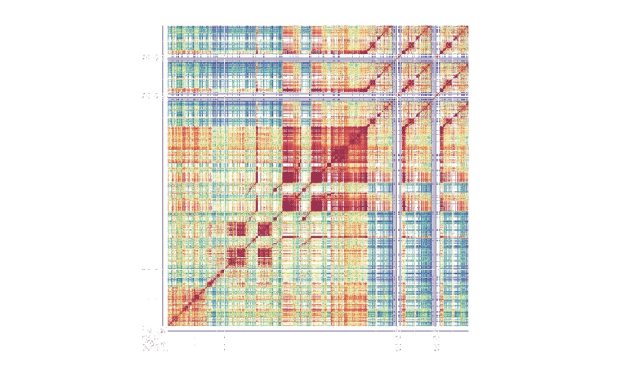Slovenian, Celtic connections and linguistics
- 24 August 2022
- 5 minutes
A children’s game of ‘I Spy’ was the catalyst which prompted a passion for Celtic languages and an official change of name for Sven Pádraig Ó Siochfhradha Prešern (Anglo-Saxon, Norse and Celtic Studies (ASNaC) 2019).
Pádraig, who graduated from Gonville & Caius College in June, can recall the exact time and place when their interest in Modern Irish first bloomed. It was in their grandmother’s garden in Rodine, a small alpine village in Slovenia, watching and listening as children from their extended family played while speaking in Irish.
“You don’t hear Irish that often especially not where I'm from – I hadn’t heard it all that much until that point,” said Pádraig, who was born and raised in Slovenia.
“I very much fell in love with the language and the way it sounded. It sent me down a big rabbit hole of research – the language, the literature. Then I started getting in touch with other learners and speakers.
“My journey to Iearn Modern Irish started by consulting various digital resources. Next followed my Irish revitalisation account on Instagram which I had for about three years and amassed 5000 followers. Then came a point when I started thinking more seriously about growing my passion for Celtic languages at university which led me to apply to ASNaC at Cambridge.”
Now on the name change. They were so inspired by Pádraig Ó Siochfhradha, a 20th century Irish language activist, writer and storyteller, that they wanted to incorporate the name officially.
“I thought it was a wonderful name. I must’ve been 18 when I did it,” adds Pádraig, who goes by Sven in Slovenia.
“By knowing my name people now know one of the main activists for the Irish language.
“I’m quite surprised my parents were so supportive, but they saw my passion for my subject. They thought ‘if it’s going to make you happy, go for it’.
“It’s my official name. I went through the entire process of changing everything. My degree certificate has it, everything.”
The degree certificate also shows Pádraig achieved a First-class Honours degree at the University of Cambridge, which has earned them a place at the University of Oxford to pursue a two-year MPhil in Linguistics, Philology and Phonetics at Jesus College Oxford which has educated many a budding Celticist in the past.
Pádraig passionately followed their interest in their undergraduate degree in ASNaC – as it is usually abbreviated – a language, literature and history degree which saw them study Old Irish, Middle Welsh, Old English, Old Norse and Latin, while also studying additional language courses in modern Irish, modern Welsh, modern Cornish, Icelandic and Hebrew.
Pádraig – featured in the video discussing ASNaC – considered further study in the summer between second and third year, preparing their Oxford application in the long vacation and submitting early, rather than adding to time pressures in the academically demanding final year of undergraduate study.
“I have a good grounding in philology, but I don’t have the background in theoretical linguistics which makes the Oxford MPhil a perfect fit for me to become acquainted with the technical intricacies of linguistics as a discipline,” they add.
Pádraig was also awarded the prestigious and highly competitive Clarendon Scholarship, which will cover their tuition fees and maintenance, including rent and a living allowance, while attached to Jesus College, Oxford.
A PhD, or DPhil if at Oxford, could follow but a move to the United States to pursue a PhD at Harvard or UCLA cannot be excluded. Meanwhile, Pádraig is also interested in natural language processing and machine learning, which could prompt a move to industry.
Many of us grow exponentially as a person at university. Pádraig is no different, despite having had the confidence to change their name earlier. Other aspects of their identity proved more challenging, internally and externally.
Pádraig uses they/them pronouns and identifies as agender, one of the non-binary identities. Now that they have accepted this themselves, Pádraig is content to share their experience to help others.
“I know gender can be very affirming for others; for me it plays almost no part in the make-up of my identity,” Pádraig adds.
“I don’t want to be constrained by societal norms or expectations of what gender is supposed to mean or not mean.
“Ever since coming to terms with my gender identity and coming out to my friends, the journey has been overwhelmingly positive. A lot of the resentment towards myself – the internalised homophobia, body dysmorphia, my eating disorder as well as feeling like I don’t belong – dissipated when I admitted to myself I don’t have to perform the same roles as people who traditionally identify as men. I found my community – the biggest treasure of all.”
Pádraig thanks their friendship group, which was scattered across the Cambridge colleges, plus the support at Caius from the Senior Tutor and the College counsellor.
“Caius was a big part of that journey and coming to the UK was without a doubt one of the best decisions I made for myself and my character,” they add.
“I feel seen for the first time. I have the chance to finally be myself and unearth interests and hobbies that got buried under layers of childhood trauma. Who knows what the future holds but I what I do know is that I’ll be living a life that is authentic and of my own weaving.”


